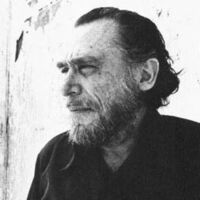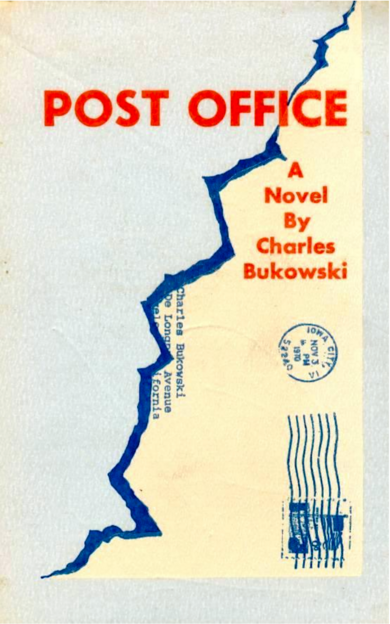Ham on Rye: 45
Graduation Day. We filed in with our caps and gowns to “Pomp and Circumstance.” I suppose that in our three years we must have learned something. Our ability to spell had probably improved and we had grown in size. I was still a virgin. “Hey, Henry, you busted your cherry yet?” “No way,” I’d say.
Jimmy Hatcher sat next to me. The principal was giving his address and really scraping the bottom of the old shit barrel.
“America is the great land of Opportunity and any man or woman with a
desire to do so will succeed . . .” “Dishwasher,” I said.
“Dog catcher,” said Jimmy. “Burglar,” I said.
“Garbage collector,” said Jimmy.
“Madhouse attendant,” I said.
“America is brave, America was built by the brave . . . Ours is a just
society.”
“Just so much for the few,” said Jimmy.
“. . . a fair society and all those who search for that dream at the
end of the rainbow will and . . .”
“A hairy crawling turd,” I suggested.
“. . . and I can say, without hesitation, that this particular Class of
Summer 1939, less than a decade removed from the beginning of our terrible national Depression, this class of Summer '39 is more ripe with courage, talent and love than any class it has been my pleasure to witness!”
196
The mothers, fathers, relatives applauded wildly; a few of the students
joined in.
“Class of Summer 1939, I am proud of your future, I am sure of
your future. I send you out now to your great adventure!”
Most of them were headed over to U.S.C. to live the non– working
life for at least four more years.
“And I send my prayers and blessings with you!”
The honor students received their diplomas first. Out they came.
Abe Mortenson was called. He got his. I applauded.
“Where’s he gonna end up?” Jimmy asked.
“Cost accountant in an auto parts manufacturing concern. Somewhere near Gardena, California.”
“A lifetime job . . .” said Jimmy.
“A lifetime wife,” I added.
“Abe will never be miserable . . .”
“Or happy.”
“An obedient man . . .”
“A broom.”
“A stiff . . .”
“A wimp.”
When the honor students had been taken care of they began on us. I felt uncomfortable sitting there. I felt like walking out.
“Henry Chinaski!” I was called.
“Public servant,” I told Jimmy.
I walked up to and across the stage, took the diploma, shook the
principal’s hand. It felt slimy like the inside of a dirty fish bowl. (Two
years later he would be exposed as an embezzler of school funds; he was to be tried, convicted and jailed.)
I passed Mortenson and the honor group as I went back to my seat. He looked over and gave me the finger, so only I could see it. That got me. It was so unexpected. I walked back and sat down next to Jimmy. “Mortenson gave me the finger!”
“No, I don’t believe it!”
‘Son-of-a-bitch! He’s spoiled my day! Not that it was worth a fuck anyhow but he’s really greased it over now!”
I can’t believe he had the guts to finger you.”
“It’s not like him. You think he’s getting some coaching?”
“I don’t know what to think.”
“He knows that I can bust him in half without even inhaling!” “Bust him!”
“But don’t you see, he’s won? It’s the way he surprised me!” “All you gotta do is kick his ass all up and down.”
“Do you think that son-of-a-bitch learned something reading all those books? I know there’s nothing in them because I read every fourth page.” “Jimmy Hatcher!” His name was called.
“Priest,” he said.
“Poultry farmer,” I said.
Jimmy went up and got his. I applauded loudly. Anybody who could live with a mother like his deserved some accolade. He came back and we sat watching all the golden boys and girls go up and
get theirs.
“You can’t blame them for being rich,” Jimmy said.
“No, I blame their fucking parents.”
“And their grandparents,” said Jimmy.
“Yes, I’d be happy to take their new cars and their pretty
girlfriends and I wouldn’t give a fuck about anything like social
justice.”
“Yeah,” said Jimmy. “I guess the only time most people think about injustice is when it happens to them.”
The golden boys and girls went on parading across the stage. I sat
there wondering whether to punch Abe out or not. I could see him flopping on the sidewalk still in his cap and gown, the victim of my right cross, all
the pretty girls screaming, thinking, my god, this Chinaski guy must be a
bull on the springs!
On the other hand, Abe wasn’t much. He was hardly there. It wouldn’t
take anything to punch him out. I decided not to do it. I had already broken
his arm and his parents hadn’t sued mine, finally. If I busted his head they
would surely go ahead and sue. They would take my old man’s last copper. Not that I would mind. It was my mother: she would suffer in a fool’s way: senselessly and without reason.
Then, the ceremony was over. The students left their seats and filed
out. Students met with parents, relatives on the front lawn. There was much bugging, embracing. I saw my parents waiting. I walked up to them, stood
about four feet away.
“Let’s get out of here,” I said.
My mother was looking at me.
“Henry, I’m so proud of you!”
Then my mother’s head turned. “Oh, there goes Abe and his parents!
They’re such nice people! Oh, Mrs. Mortenson!”
They stopped. My mother ran over and threw her arms about Mrs.
Mortenson. It was Mrs. Mortenson who had decided not to sue after many, many hours of conversation upon the telephone with my mother. It had been decided that I was a confused individual and that my mother had suffered enough that way.
My father shook hands with Mr. Mortenson and I walked over to Abe.
“O.K., cocksucker, what’s the idea of giving me the finger?”
“What?”
“The finger.”
“I don’t know what you’re talking about!”
“The finger.'”
“Henry, I really don’t know what you’re talking about!”
“All right, Abraham, it’s time to go!” said his mother. The Mortenson
family walked off together. I stood there watching them. Then we started
walking to our old car. We walked west to the corner and turned south.
“Now that Mortenson boy really knows how to apply himself!”
said my father. “How are you ever going to make it? I’ve never
even seen you look at a schoolbook, let alone inside of one!”
“Some books arc dull,” I said.
“Oh, they’re dull, are they? So you don’t want to study?
What can you do? What good are you? What can you do? It
has cost me thousands of dollars to raise you, feed you, clothe you! Suppose I left you here on the street? Then what would you do?”
“Catch butterflies.”
My mother began to cry. My father pulled her away and down the block to where their ten-year-old car was parked. As I stood there, the other
families roared past in their new cars, going somewhere.
Then Jimmy Hatcher and his mother walked by. She stopped.
“Hey, wait a minute,” she told Timmy, “I want to congratulate Henry.”
Jimmy waited and Clare walked over. She put her face close to
“line. She spoke softly so Jimmy wouldn’t hear. ”Listen, Honey,
any time you really want to graduate, I can arrange to give you
your diploma.”
“Thanks, Clare, I might be seeing you.”
“I’ll rip your balls off, Henry!”
“I don’t doubt it, Clare.”
She went back to Jimmy and they walked away down the street. A very old car rolled up, stopped, the engine died. I could see my mother weeping, big tears were running down her cheeks.
“Henry, get in! Please get in! Your father is right but I love
you!”
“Forget it. I’ve got a place to go.”
“No, Henry, get in!” she wailed. “Get in or I’ll die!”
I walked over, opened the rear door, climbed into the rear seat.
The engine started and we were off again. There I sat, Henry Chinaski, Class of Summer '39, driving into the bright future. No, being driven. At the
first red light the car stalled. As the signal turned green my father was
still trying to start the engine. Somebody behind us hooked. My father got
the car started and we were in motion again. My mother had stopped crying. We drove along like that, each of us silent.





